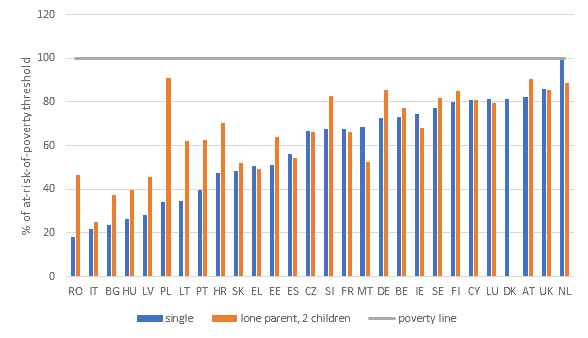The coronavirus crisis has punched a hole in Europe’s safety nets. But they were already frayed and urgent repairs are needed.

In the wake of the coronavirus shock to the healthcare system we can expect a shock of at least equal magnitude to the economy and the fabric of society. We must not make the mistake of underestimating that impact.
Can social safety nets in Europe provide adequate protection to the huge numbers who have already lost their livelihoods or will do so? Except perhaps for a few countries, the answer is a resounding no.

Many countries have taken crisis measures to shelter citizens from the economic impact of Covid-19. (Temporary) unemployment-insurance benefits are of paramount importance for families forced to stay home, and many European Union member states have eased access to these schemes and implemented additional bonuses for those unable to do their jobs.
There are signs however that, in spite of these measures, a ‘forgotten’ group of vulnerable workers is having to turn to means-tested, minimum-income-protection benefits: workers with non-standard contracts, freelancers, self-employed individuals. And many others will eventually deplete their entitlement to unemployment insurance and similar contributory benefits.
Well below thresholds
It cannot be stressed enough how inadequate means-tested, minimum-income support is in most EU countries. Guaranteed minima fall well below widely-used poverty thresholds (see figure). The picture holds whether one considers a relative threshold or reference budgets as a yardstick, although the exact ranking of the countries will change.
Net disposable income at minimum income for a hypothetical single person and a lone parent with two children, relative to the EU 60 per cent at-risk-of-poverty threshold, EU27 + UK, 2018

Some within-country variation gets lost in this chart. In some member states, minimum income protection is (partially) a regional or municipal competence, with exact levels and access to supplementary benefits depending on local policies.
It is well documented that people often find it difficult to gain access to the benefits to which they are entitled. Application procedures can be complicated, cumbersome, lengthy and stigmatising. Access conditions vary greatly between countries but they tend to be quite stringent. Strict income tests apply and assets are usually taken into account. Apart from a modest family home, a household may be disqualified simply because they have a limited amount of savings in their bank account.
Procedures that hamper access to adequate protection are problematic at the best of times. They are even more of a barrier in times of rapidly rising caseloads and social distancing.
Not normal times
Existing social safety nets cannot be relied upon to provide adequate protection. First, the levels offered by minimum-income schemes in many countries are far too low. Many governments worry about ‘work incentives’, a legitimate concern in normal times. But these are not normal times.
Still, work incentives do remain to some extent a point of attention during the crisis. Essential workers, in health care, food or distribution, are often not very highly paid. Then again, these people render vital services and deserve to be paid properly—especially in times such as these. One could consider a temporary ‘corona supplement’, to help people with the hardship caused by containment. Priority should be given to families with children. Additional support could also be provided through child-benefit supplements.
Secondly, the group now turning to welfare benefits is likely overall to be somewhat better off than the traditional target group. Countries with very stringent asset tests may leave this group out to dry until they have fully depleted their savings, but this may in the long run be counterproductive. It might be better to relax such conditions.
Thirdly, application procedures should be eased and simplified. Normally means-tested benefits are only granted after a full investigation of the household situation. One might consider a simplified procedure, limited to a check of administrative records to see whether the household has other incomes or is entitled to other benefits. Clearly, this is easier in countries with good administrative infrastructures.
Fourthly, people should be allowed to earn some additional money while on minimum-income protection. Many countries already have earnings disregards. Where public budgets are under pressure or scarce, this may offer some alternative to actual benefit increases.
Finally, funding will become an issue in countries where financing of means-tested benefits is (partially) devolved to municipalities. National governments, which usually have broader financing instruments, may consider fully covering the benefits of those who enter such schemes in the coming months or setting up emergency funds for hard-hit municipalities.
The time to enact these measures is now. There will be no excuse for governments who do not act quickly or decisively enough.
Ive Marx is director of the Centre for Social Policy Herman Deleeck and professor of social policy at the University of Antwerp. He is the author of several books and articles on minimum income protection. Sarah Marchal is a post-doctoral researcher at the Centre for Social Policy Herman Deleeck. Her research focus is on the adequacy and accessibility of minimum-income schemes in EU member states.